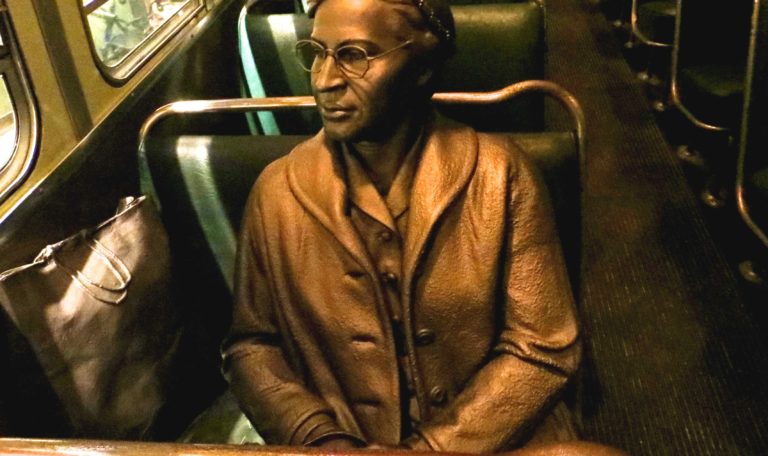Dear People and Friends of the Diocese of New Jersey,
Whoever serves me must follow me, and where I am, there will my servant be also. —John 12:26

Rosa Parks was born on this date, February 4, in 1904, which seems especially appropriate as February is designated Black History Month. Of course, Rosa Parks and her story are an integral part of this country’s story, not just in February but always; every hour of every day of every year, just as Black history is an integral part of this country’s history not just one month a year, but throughout the year. It’s especially important to be clear about this today as some in this country are working to obscure and silence the teaching of Black history and its various and complex dimensions including so-called “critical race theory.”[1] It’s a sad, appalling state of affairs that represents a walk backwards.
Rosa Parks’ mark on history was made when she took a seat in the front of a bus on December 1, 1955. Often, her character, leadership and fortitude in taking this seat are misrepresented in the telling of the story. According to Arlisha Norwood of The National Women’s History Museum:
By the time Parks boarded the bus in 1955, she was an established organizer and leader in the Civil Rights Movement in Alabama. Parks not only showed active resistance by refusing to move she also helped organize and plan the Montgomery Bus Boycott. Many have tried to diminish Parks’ role in the boycott by depicting her as a seamstress who simply did not want to move because she was tired. Parks denied the claim and years later revealed her true motivation: “People always say that I didn’t give up my seat because I was tired, but that isn’t true. I was not tired physically, or no more tired than I usually was at the end of a working day. I was not old, although some people have an image of me as being old then. I was forty-two. No, the only tired I was, was tired of giving in.”[2]
As Norwood observes, “Parks’ courageous act and the subsequent Montgomery Bus Boycott led to the integration of public transportation in Montgomery. Her actions were not without consequence. She was jailed for refusing to give up her seat and lost her job for participating in the boycott.”
Often overlooked in the telling of Rosa Parks story is the depth of her Christian faith and the degree to which this informed her decision that day on the bus in Selma and, indeed, her entire life. Rosa Parks was a devout member and deaconess of the A,M.E. Church. As her biographer Jeanne Theoharis has observed, “There is no way to understand how she makes that stand, without understanding that at the core of her activism is her faith.”[3]
Faith, true Christian faith, calls people to action even when the action comes at personal costs. Love, Christ’s love, calls disciples of Jesus Christ to journey to those places in life and the world where human need and injustice intersect, places of oppression, hunger and poverty, of violence and bigotry, of suffering and sickness.[4] It is in these places and circumstances where Jesus is found and where Jesus’ disciples are to be found. As Jesus tells us, “Whoever serves me must follow me, and where I am, there will my servant be also” (John 12:26).
God bless you and keep you as you serve and follow Jesus.
Faithfully,
 The Right Reverend William H. Stokes
The Right Reverend William H. Stokes
Bishop of New Jersey
________________
Notes
[1] See for example,Bella, Timothy “Black History Month is not Critical race Theory, Alabama educator says in response to complaints” – The Washington Post, February 4, 2022 which shoes troubling evidence of the on-going confusion and suppression of dialogue and education around the question of race and racism – found at https://www.washingtonpost.com/education/2022/02/04/alabama-black-history-month-crt-schools/
[2] Norwood, Arlisha “Rosa Parks” National Women’s History Museum website found at https://www.womenshistory.org/education-resources/biographies/rosa-parks
[3] Theoharis, Jeanne in an interview “The Rosa Parks Papers” – Religious and Religion and Ethics Newsweekly produced by PBS, February 1, 2013 found at https://www.pbs.org/wnet/religionandethics/2013/02/01/february-1-2013-the-rosa-parks-papers/14627/
[4] See Luke 4:16-21 and Luke 9:23-24















